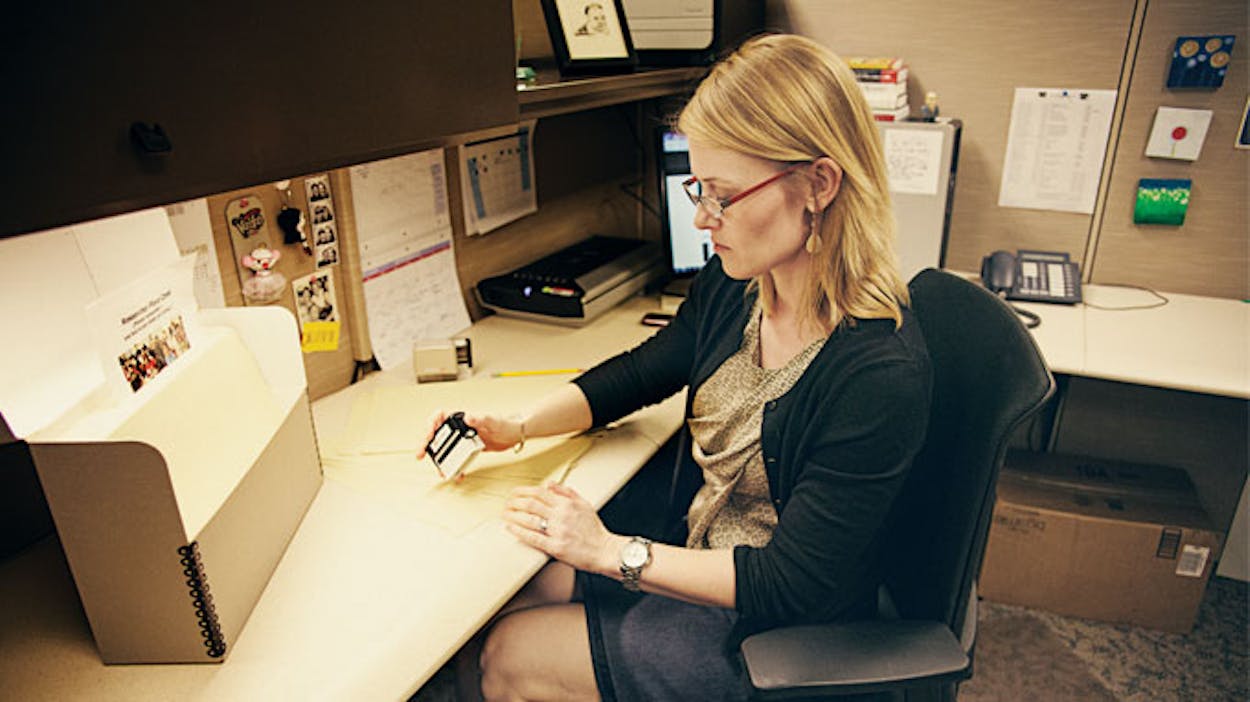Information is withheld only for a good reason. That might be the most important thing I’ve learned in my nine years as an archivist.
As a child, I wanted to work in a library. I figured I’d be able to read all the time—I just wanted to be alone and read. Now that is exactly what I get to do; I read really fascinating things. Before I came to Dallas, I worked for seven and a half years at the LBJ Presidential Library, in Austin. That’s a very established library, and I learned a lot there, working in the reading room and helping students conduct their research.
The George W. Bush Center isn’t open yet, so at the moment I spend my days in a big warehouse in Lewisville. There are about twenty archivists and thousands of boxes of paper. We are reading every single document created either by former president Bush or by his staff during his eight years in office and determining what needs to be opened to the public.
My official title is archivist. What most people don’t know is that I am an employee of the National Archives and Records Administration, which means I work for the government. All the archivists at the library are nonpartisan—this surprises people at dinner parties—and we report to the current president, even though the library is being built with private funds. My job requires me to preserve, arrange, describe, and review documents for access and then provide that access. Until the library is open, the only people who get that access are members of Congress, the courts, Bush, and Barack Obama. But there are many other people who will want to see these records eventually, and that’s where I come in.
We have to read 70 million pages of records line by line to determine what access we can provide. Sometimes the documents contain classified national security information, and we can’t release them. Or maybe we find a little bit of personal information that we can redact and still release the document. The Presidential Records Act directs archivists on how to read the documents and what to withhold for reasons of national security and personal privacy. That act also dictates how a presidential library is set up, how it’s funded, and even the library’s square footage.
The best part of my job is that I get to touch history. I get to see things other people don’t get to see. Of course, I don’t get to talk about them, especially the stuff I redact. Sometimes the reasons to redact make immediate sense, sometimes not. Other times, people see a document with black lines all over it—even in a movie or on TV—and their imagination takes them beyond reality. At the LBJ Library, we got a lot of calls from people with theories about the Vietnam War and a few about the Kennedy assassination.
One thing that is different about Bush’s library is the amount of electronic information that was created during his two terms. His presidency was certainly the most digital of any up until that time, and all the emails are taking a long time to process. There are eighty terabytes of information. I didn’t even know what a terabyte was. It’s one trillion bytes, or one thousand gigabytes.
There will be a lot of interest in this library, of course, especially since Bush’s two terms included 9/11 and then war. According to the Freedom of Information Act, citizens must wait five years before they can request a president’s records—and there are a lot of people who have been waiting since the end of Bush’s presidency. So January 20, 2014, will be a big day for us.
I think the former president and Mrs. Bush have been waiting too. I haven’t had any interaction with them yet. I know he has visited the site of the library, at SMU, and I hope to see them when we open, especially since the former first lady was a librarian. We share a love for the same thing. Librarians and archivists have a similar goal: they ultimately want to make information available to the public.
Opening records allows people to see how democracy works. I know it can feel daunting to come in and ask for records, and there are a lot of them, but try us. Come in and ask for something—anything—related to the Bush presidency. Hurricane Katrina, 9/11, Iraq, Afghanistan, the president’s faith-based initiatives, his Supreme Court nominees. Just come in and read.
As told to Jason Sheeler on April 19, 2012
- More About:
- Texas History
- LBJ
- George W. Bush








